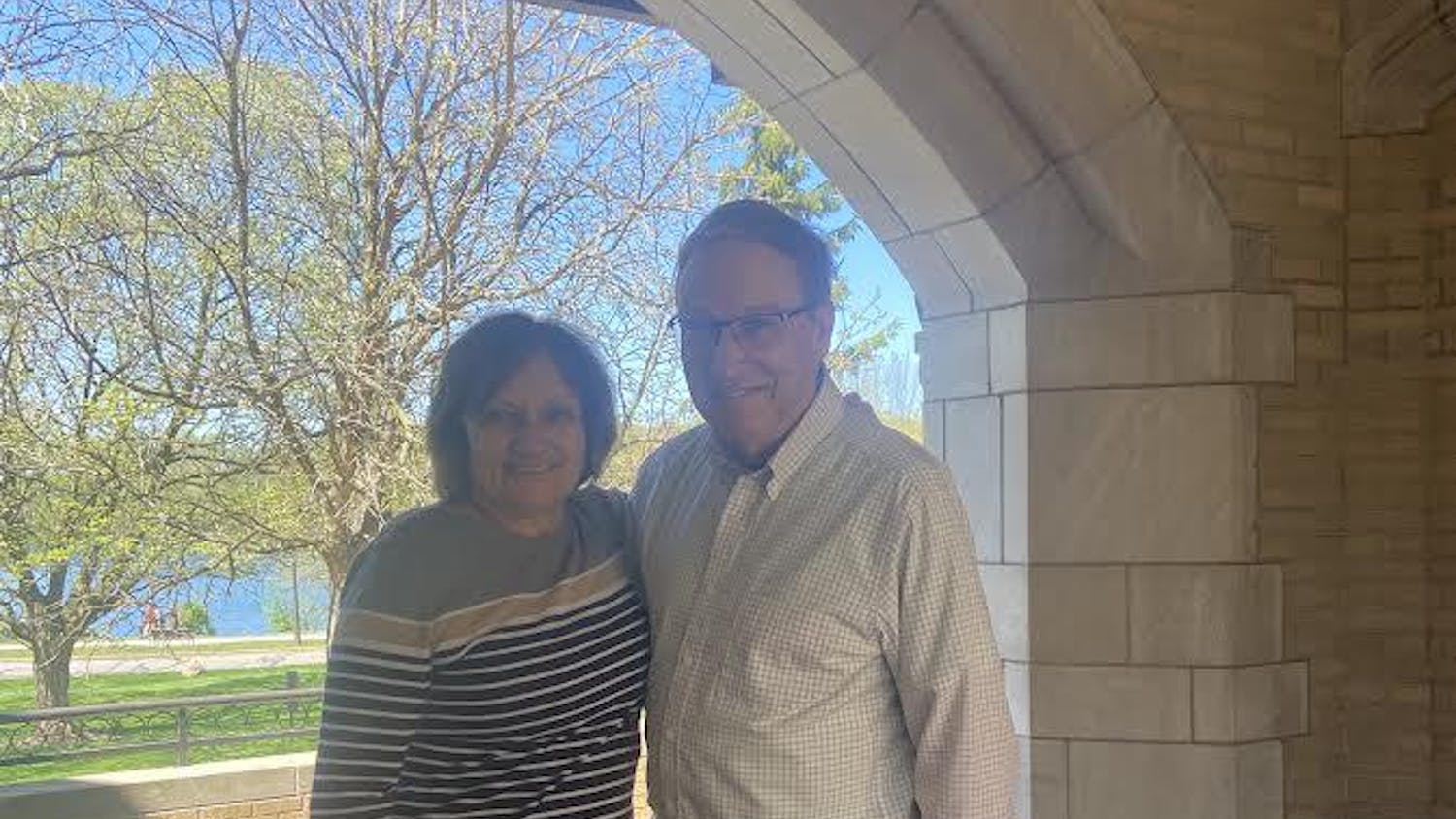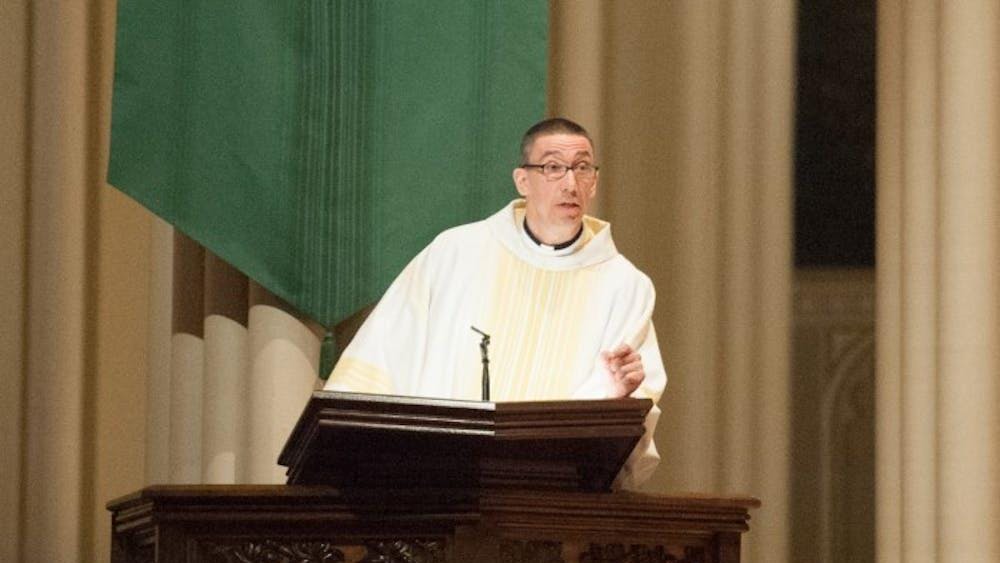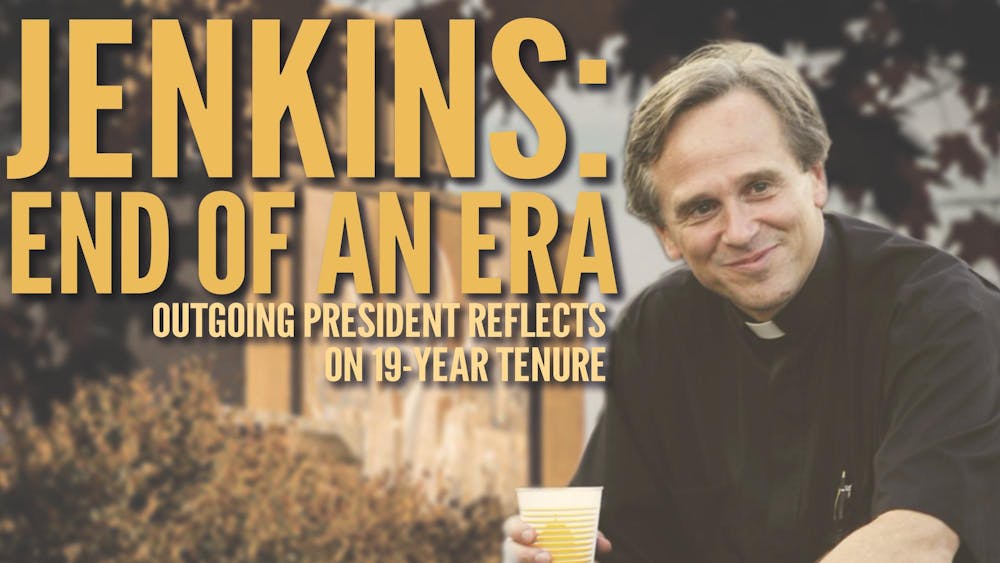Thirty minutes before sociologist Charles Murray was scheduled to speak in McKenna Hall on Tuesday, students began to gather outside the building; some carried signs with slogans protesting Murray, and many were dressed in black.
“We’re out here to let students know that not everyone on this campus believes what’s written in Charles Murray’s books and articles,” fifth-year Rachel Wallace said. “ … We want to present an alternative narrative to what he’s proposing.”
Murray — best known for co-writing “The Bell Curve” in 1994 — is a libertarian political scientist. “The Bell Curve” argues that genetics at least partly determines economic and social success; his critics, however, argue the book approaches claiming that race is a genetic factor contributing to IQ differences.
The protest was organized by student activist group We Stand For, a group that has organized a number of protests on campus since the election of President Donald Trump.
Murray spoke at Middlebury College on March 2, but the event turned violent, leaving one professor injured and forcing Murray to be interviewed via live stream.
The demonstration in front of McKenna did not turn violent, even as students began to leave the area designated for them by Notre Dame Security Police (NDSP) in small groups at 12:57 p.m. to approach the door of McKenna Hall, where they were blocked by NDSP officers. Once there, four Ph.D. students read the letter 67 graduate students submitted to The Observer.
Protesters then began to chant: “Who is the enemy? White Supremacy,” “Your message is hatred, we cannot tolerate it” and “We stand for love, we stand for justice and we stand for equality.”
At one point, Holy Cross guest student Patrick Guibert approached the protesters and asked them to cite where Murray promoted “white supremacy and eugenics,” to which individual protestors asked him why he was defending “a white supremacist” and “Where are your receipts?”
“My concern during today’s event is that more recently, there has been a tendency to mob up against people and mischaracterize people and judge people,” Guibert said in an interview after the protest. “My concern about the protest, I feel, was fear that any mischaracterization or misrepresentation of [Murray] or his arguments would undermine progressive social change, and it would undermine the completely legitimate criticism of his points that we wanted to raise.
“ … When I tried to ask what specifically has he said, I got shut down by everyone.”
Many of the protesters, including senior Natalie Thomas, president of the Black Students Association, cited Murray’s work on “The Bell Curve” as their reason for joining the protest.
“I think the problem comes when a lot of the students feel targeted,” Thomas said. “ … That’s why I think it’s problematic that he was invited.”
Some protesters, however, were torn about whether or not to join the demonstration.
“I was really undecided,” senior Mercy de la Rosa said. “One of the police officers … is my friend and I didn’t want to make it about NDSP. It just felt like a lot when Ann Coulter came my freshman year — and actually it’s a lot of the same people here today — so for me, I wanted to stand for something. It’s really insulting to be Hispanic and work really hard and get into law school, even, and to be told that that’s only because I’m Hispanic.”
Second year law student Terrence Way said he “took the liberty to do some independent research” after hearing that Murray had been scheduled to appear on campus. He said “it’s appalling to see that sort of thing here.”
“When it comes to discourse, it’s not a problem of having controversial ideas,” Way said. “We’re mature enough people to understand that our point of views are not the end all, be all of the universe — we know that. It’s when you try to engage in discourse with false narratives. It makes no sense and it doesn’t represent who we are as a university.”
Notre Dame has an “Open Speaker Policy,” which states students and student groups “may invite and hear any person of their own choosing,” although the sponsorship of guest speakers “does not imply approval or endorsement” of the views by the group or the University.
“I hope the University takes a closer look at its speaker policy in the future and sees how the speakers affect the students on our campus and ask if it fits in with our mission and if we want our name on it,” Wallace said.













